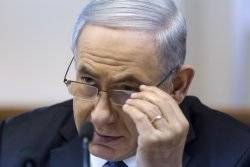Israel's prime minister has sacked two senior cabinet ministers from his divided government and said he will call early elections.
Benjamin Netanyahu's office said on Tuesday he had ordered the dismissals of Finance Minister Yair Lapid and Justice Minister Tzipi Livni.
"I will not tolerate any opposition in my government," a statement from Netanyahu's office quoted him as saying.
It said he would call for dissolving the parliament as soon as possible and seek a "clear mandate" from the public to lead the nation.
The current government took office in early 2013 and has been riven by divisions.
The coalition government has been divided over key issues in recent weeks, and Lapid and Livni have emerged as fierce critics of the prime minister.
"The firing of ministers is an act of cowardice and loss of control,'' Lapid said after his dismissal.
"We are sad to see that the prime minister has chosen to act without consideration for the national interest and to drag Israel to unnecessary elections.''
Jewish state bill
Addressing a news conference shortly after dismissing the ministers, Netanyahu said he would act to table a bill to dissolve the current parliament.
He said it is impossible to lead the country with a government that is not functioning properly, an apparent reference to the two ministers who have criticized his policies.
Netanyahu's coalition, dominated by the right-wing, is split on a range of issues, including the 2015 budget, high living costs, policy towards the Palestinians and a Jewish nation-state bill.
Livni had been the most outspoken opponent to the Jewish state bill, which has been widely criticized internationally and domestically as discriminating against Israeli-Palestinian citizens.
If early elections are held, Israeli media say the most likely date is March.
Two television polls on Tuesday said Netanyahu's rightist Likud party would emerge once again as the largest group in parliament if elections were held today, almost certainly ensuring him a fourth term as prime minister.
"Even though his popularity has gone down over the 50- days Gaza war he still the favorite to win an election," Al Jazeera's Andrew Simmons, reporting from Jerusalem, said.
"What we are seeing now is him asserting himself and using the term 'opposition within the cabinet'. He says a day does not go by without his policies being challenged by his fellow coalition members."
The government waged a fierce war against fighters in the Gaza Strip over the summer. Negotiations to reach peace with the Palestinians ended in failure last spring.
In the occupied West Bank, Palestinian Foreign Minister Riad Malki said opinion polls indicate the next Israeli government may be "more right-wing and extreme.'' He said this could bolster international support for the Palestinian cause.
In Brussels, US Secretary of State John Kerry declined to comment on the "internal politics" of Israel.
"But obviously, we hope that whatever government is formed - or whether there are elections, that those elections will produce - the possibility of a government that can negotiate and move toward resolving the differences between Israelis and Palestinians," he said.
PHOTO CAPTION
Israeli Prime Minister Benjamin Netanyahu listens during in his Cabinet meeting in his office in Jerusalem on Sunday, Nov. 23, 2014.
Aljazeera


 Home
Home Discover Islam
Discover Islam Quran Recitations
Quran Recitations Lectures
Lectures
 Fatwa
Fatwa Articles
Articles Fiqh
Fiqh E-Books
E-Books Boys & Girls
Boys & Girls  Hajj Rulings
Hajj Rulings Hajj Fatwas
Hajj Fatwas














